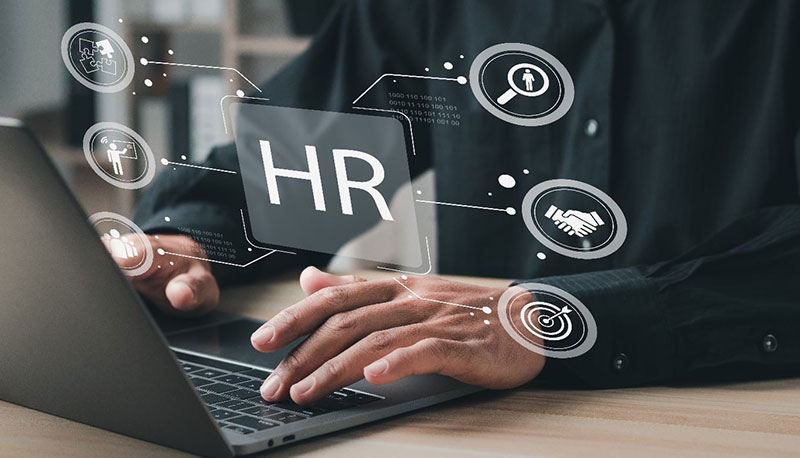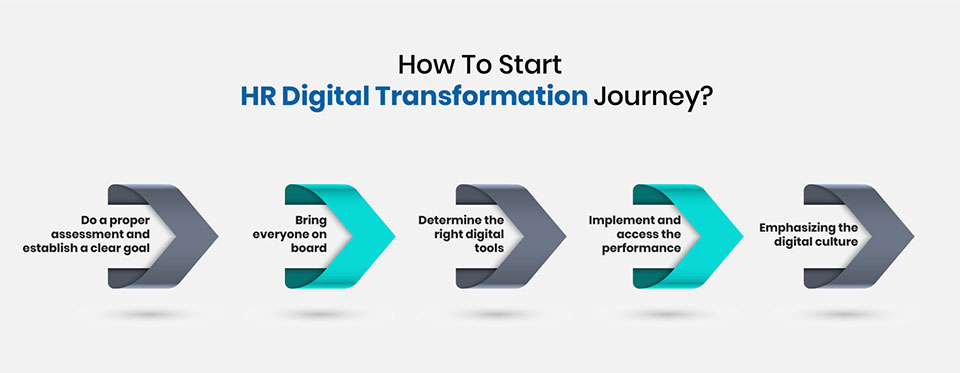
Human-technology partnership is vital in this fast-evolving landscape of modern workplaces. Shouldering this responsibility human resources or HR professionals are to optimize their HR process and go through a paradigm shift that begins with the advent of HR digital transformation.
This ground-breaking initiative aims to enhance the employee experience and drive organizational success. The key is to help organizations to “be digital” not “do digital”. And there's a big difference between the two— the focus is not on technology but on organizational change using technology. With digital transformation, HR leaders will explore new technologies and platforms to escalate their way of working.
This comprehensive guide will dive deeper into this phenomenon of HR digital transformation: what it is, why it is important, how you implement it, the challenges, and examples backed with case studies.
HR digital transformation is a strategic process of changing HR practices from traditional to advanced technology that results in enhanced HR operations, consequently improving the overall employee experience.
HR digital transformation involves adopting innovative and modern technologies and practices to make the HR process automated and data-driven. A recent article by Forbes stated that Digital Maturity Within The HR Function Is Key For Any Organization. The main goal is to optimize the efficiency and effectiveness of HR leaders by streamlining their functions and enabling data-driven decision-making. And this leads us to the next very vital question.
It may seem overly ambitious for an organization of any size to halt traditional methods and opt for an HR digital transformation, but it is the call of the times.
Though different perceptions of this buzzword exist around the corporate world, the gist mainly focuses on technological advancement. But first thing first. As a rule of thumb, any changes in the organization must have clear objectives and make business sense.
That being addressed, the real question arises– why is digital transformation important to HR teams? Here are a couple of generalized answers.
There are numerous examples of how the HR field is (slowly) transforming:
Implementing HR digital transformation in an organization is a bit complicated— or you may say, needs a comprehensive understanding of the requirements. Because it is impractical to think that an organization can go from non-digitized to fully digitalized. Since it is about redesigning an organization by implementing digital and technological advancements by critically valuing the business requirements, the transformation process will be time-consuming,
The Forbes article mentioned above, states that the digital transformation journey in HR professions begins with the first and crucial step of self-discovery— understanding what your company lacks and needs.
That being said, the four significant steps in implementing a digital transformation in HR are -
Self-discovery— understand your organization, analyze the pain points, inefficiencies, and areas that can benefit from digitalization, and formalize an idea.
Engage in active communications— all stakeholders, including HR staff and employees, need to partake in this digital transformation. Their shared views will help strategize the roadmap.
Strategize— with insights gathered, strategically roll out solutions. And ensure that they are scalable and compatible with your existing systems.
Culture— HR digitalization is an ongoing process. So, encourage a culture of adaptability and continuous learning to ease the transition.
HR digital transformation is currently a hot topic in the corporate world. But, it is one thing to talk about digital HR transformation than to do it. In other words, this digital transformation in HR includes HR professionals and organizations as well. Meaning, that the digital transformation will encounter tough challenges upon implementation.
While these challenges are common during a culture shift, HR professionals must upskill and reskill themselves before partaking in the organizational change.
It is important to note that for every organization, keeping up with technology trends and implementing digital transformation is critical and won’t occur overnight. Addressing these challenges will be the prime requirement of HR professionals.
After addressing the challenges of implementing digital transformation in HR, it is time you get started with HR digital transformation. But where to start from?
Digital transformations do not happen in the blink of an eye. It requires a proper roadmap for enactment and ample time for the entire workforce to adapt. Here’s how you can kickstart the transformational journey.

Let's understand these points thoroughly,
Set a clear goal backed by a thorough assessment before starting the digital transformation process. As previously stated, any changes must have clear objectives and make business sense. So, start by identifying areas that will require improvement and align the transformation with your organizational goals.
The HR transformation process must focus on the employee as an end-user. Making it easy to guide the employees in showing where the organization will allow them to explore other factors such as digital leadership models, organizational network analysis, etc.
The change is inclusive of every working individual in the organization. This means that all stakeholders, from employees to the C-suite, and everyone in between must be with you for a successful digital transformation. Bring everyone on board and effectively communicate with them.
Surplus software and technologies are available to help organizations streamline their work, improve experiences, and automate processes. But before opting for the upgrade, you need to evaluate the digital tools and technologies available by aligning them with your HR goals.
Keep in mind that committing to tools blindly may disrupt your transformation process and impact your long-term goals and crucial functions like onboarding and offboarding of employees, performance management, tracking and validating timesheets, etc.
Start by gradually implementing the selected HR technology and aim for seamless integration with existing HR data and systems. Your goal is not to disrupt the existing system but to bring a gradual, easy-to-adapt change. Implementing the software is not the end of the process but the beginning of a new task— measuring and optimizing performance.
Monitor the process, keeping the performance and the employee experience into account.
Technology is not the only requisite of an HR transformation but the digital transformation of an entire organization. Hence, it is vital to prioritize employees' experience to ensure the plan addresses their needs and offers sufficient communication about the changes. Periodically gather feedback and understand the mindset of everyone involved. And build a healthy company culture.
Anchor Trust
Enhanced candidate experience by utilizing chatbots.
The biggest not-for-profit housing association in the UK— Anchor Trust, created a better recruitment process alongside prioritizing candidate experience. They had a clear goal–– to engage with a pool of potential candidates.
To achieve this, Anchor Trust started using a purpose-built recruitment, Chatbot Integra, in Facebook Messenger. Designed to understand questions, this chatbot could initiate conversations on screen and engage with candidates directly.
However, the success of this initiative was not dependent on technology alone.
The company strategized the chatbot by creating targeted social media campaigns and leveraging Facebook's robust analytics tools. This way, the chatbot crafted messages tailored to resonate with their target audience.
The results of this transformation,
IBM
Pioneering automated HR operations and empowered employees with AI
IBM, a global company housing a workforce of over 400,000, is at the forefront of the digital HR revolution. Using a series of innovative experiments, the company has driven the evolution of HR solutions to a new level.
The company has introduced a revolutionary feedback process— "Checkpoint," that has boosted engagement, alignment, and goal management within its performance management system. Not only that, IBM strives for continuous development, and in the pursuit of continuous learning, the company is committed to a dynamic digital learning platform. This powerful platform has empowered employees to share and access valuable content and get training recommendations and external online learning resources.
IBM's commitment to digital transformation is commendable. To enhance HR operations, IBM harnessed AI investment in Watson to pilot CHIP (Cognitive Human Interface Personality), an intelligent chatbot, to handle HR inquiries.
Results:
For HR professionals eager to initiate digital transformation, ascertain that your roadmap is concise and functional. Implementing HR digital transformation is great, but doesn’t make sense if you don’t look at their results. With TMI, you can leverage HR functions to respond to the challenges of a more digitalized future and arm yourself for these new challenges.

CredBadge™ is a proprietary, secure, digital badging platform that provides for seamless authentication and verification of credentials across digital media worldwide.
CredBadge™ powered credentials ensure that professionals can showcase and verify their qualifications and credentials across all digital platforms, and at any time, across the planet.

Please enter the License Number/Unique Credential Code of the certificant. Results will be displayed if the person holds an active credential from TMI.